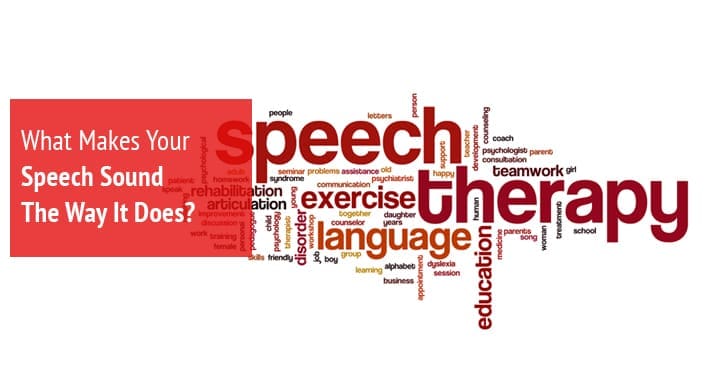
The way we speak can have a big impact on our lives.
Your accent, how fast you speak, and the way you pronounce words can impact the way you’re perceived by others.
There are many reasons why someone might alter their speech patterns.
Sometimes people will choose to undergo speech therapy in order to improve or correct certain aspects of speech, such as stuttering.
Others may undergo accent modification therapy to reduce the discrimination they may experience.
Even actors often undergo training to speak in different accents for their various roles.
We’re District Speech and we offer speech therapy in Washington DC.
Today we’re going to take a closer look at a few aspects of speech and vocalization.
Understanding how your speech works can help you to understand why you speak the way you do.
Keep reading to learn more.
What Are The Different Aspects Of Vocalizations?
The way you speak and how your voice sounds is influenced by multiple factors.
For example, your background, experience, and cultural influences can all influence how you vocalize your speech.
Today we’ll take an in depth look at some aspects of vocalization.
Your vocalization includes your pronunciation, articulation, projection, tempo, timbre, pause placement, and pitch.
That’s a lot of factors, so let’s get to it.
1. Pronunciation
Pronunciation is how we make the sound of each letter in a word.
Pronunciation also involves which syllable we place the emphasis on.
Some words can spark debate as to their proper pronunciation (for instance, do you say “gif” with a soft g or a hard g?).
Other words are pronounced differently in different regions.
Generally, though, you can look up the pronunciation of words online fairly easily.
Pronunciation may not seem important to speech, but it actually is.
Of course, how you pronounce words has a pretty big impact on how your speech sounds.
But on top of this, mispronouncing words can actually detract from your credibility when you speak.
Additionally, having an accent because English isn’t your native language can cause you to mispronounce words.
This is why some people, for example, Spanish speakers in the United States, may choose to attend speech therapy for accent modification.
The best thing to do if you’re unsure of a word’s pronunciation is to look it up.
2. Articulation
The way we form consonants and vowels is called articulation.
Other words for this concept are enunciation and diction.
When we say a word, we use our tongue, jaw, lips, and palate in order to make the sounds of speech.
The more clearly you articulate, the clearer and more distinct the sounds are when you speak.
Sometimes we’ll use different articulation in different settings.
For instance in a formal meeting you might say “We are not going to meet the targets this year”.
In this case, you articulate each word clearly.
However, if you are at home and need milk, you may say “I’m just gonna pop out to the store real quick”.
This shows an articulation difference between these two scenarios.
When you’re at home, instead of articulating every word, you might blend words (like “gonna” instead of “going to”).
If you have an articulation disorder, it affects how you can articulate words, and therefore the clarity of your speech.
These disorders can include cleft lip & cleft palate and tongue thrust.
However, even with articulation disorders, practicing your articulation skills can help you overcome articulation difficulties.

3. Projection
Projection relates to the volume, clarity, and resonance of your voice.
Someone with good projection should be able to be heard easily and clearly, without the need to shout.
Good projection is helpful when you’re speaking to a group of people.
Actors often learn how to project their voice to be heard from the stage.
Teachers typically have good projection, too.
After all, a class of children isn’t going to listen to you if you’re speaking quietly and timidly.
If your projection is poor, people may have difficulty hearing you when you speak.
You may also find that the only way you can speak loudly is by shouting.
Good posture and proper breathing techniques can help with projection.
4. Pace/Tempo
Speaking too quickly, or too slowly, can have impacts on how your words are perceived.
Striking the right balance is important for how you come across to others.
If your tempo is too fast when you speak, people may have difficulty understanding your words.
You might also come across as not taking things seriously, and your pronunciation can suffer.
Speaking quickly can be common in people with ADHD.
It can also be a symptom of anxiety.
Just like with projection, focusing on breathing techniques can help you slow down your speech.
Sometimes, recording and listening to your speech can also help you figure out where you need to slow down.
Conversely, speaking too slowly can be monotonous and boring for others to listen to.
If you consistently speak slowly, this may be due to something like dysarthria.
Dysarthria occurs when the muscles you use for speech are weak.
It’s common when you have a disorder that affects your muscles, such as cerebral palsy.
It can also be caused by a stroke or traumatic brain injury.
Whatever the cause, at District Speech our therapists can help whether your speech is too slow or too fast.
Finding a comfortable rate of speech can help you get your point across and communicate effectively.
5. Timbre
Timbre refers to sound quality or vocal quality.
If your voice comes across as scratchy, breathy, or soft these are all examples of vocal timbre.
Vocal exercises that focus on pitch and clarity can be used to help you develop a clear timbre.
However, your timbre is part of your voice.
While you can alter it to help yourself sound clearer, you probably can’t dramatically change your timbre.
It’s what makes your voice distinctly yours.
6. Placement Of Pauses
While. Speaking. With. Lots. Of. Pauses. May work for William Shatner, in general conversation this is usually ill advised.
Speaking in short concise sentences, with appropriate pauses can help others understand the point you are trying to make.
While longer sentences can work on the written page, phrases spoken aloud need to be shorter in order for people to digest your point.
It’s also important to avoid filler words, also called vocalized pauses, such as “uh” and “um”.
These words can distract from the overall message you are trying to convey.
If you experience a fluency disorder like stuttering or cluttering, you may find it challenging to appropriately place pauses.
This might be because you speak more slowly with more space between words to prevent stuttering.
It could also be because you pause when you stutter.
Whatever the reason, it is possible to improve your placement of pauses to make your speech clearer and easier to understand.
7. Pitch
This refers to how high or low your voice is when you speak.
Altering your pitch can help convey meaning.
For example, you might raise the pitch of your speech at the end of a sentence when you’re asking a question.
You might also lower your voice for dramatic effect.
Speaking without altering pitch results in monotone speech, which is boring to listen to.
Book Your Appointment With District Speech Today
Do you need to work on some aspect of your speech?
Perhaps you have a habit of using filler phrases such as “um” and “uh”.
Or you’ve been told you mumble when you speak, and to work on articulation.
District Speech can help you correct these and other speech and communication issues you might be facing.
Contact us today to learn more about all of the issues we can help with.
Book your appointment with District Speech today.
1300 I St NW, Suite 400 E,
Washington, DC 20005
- https://g.page/districtspeech
District Speech and Language Therapy specializes in speech therapy, physical therapy, and occupational therapy solutions, for both children and adults, in the Washington D.C and the Arlington Virginia areas.